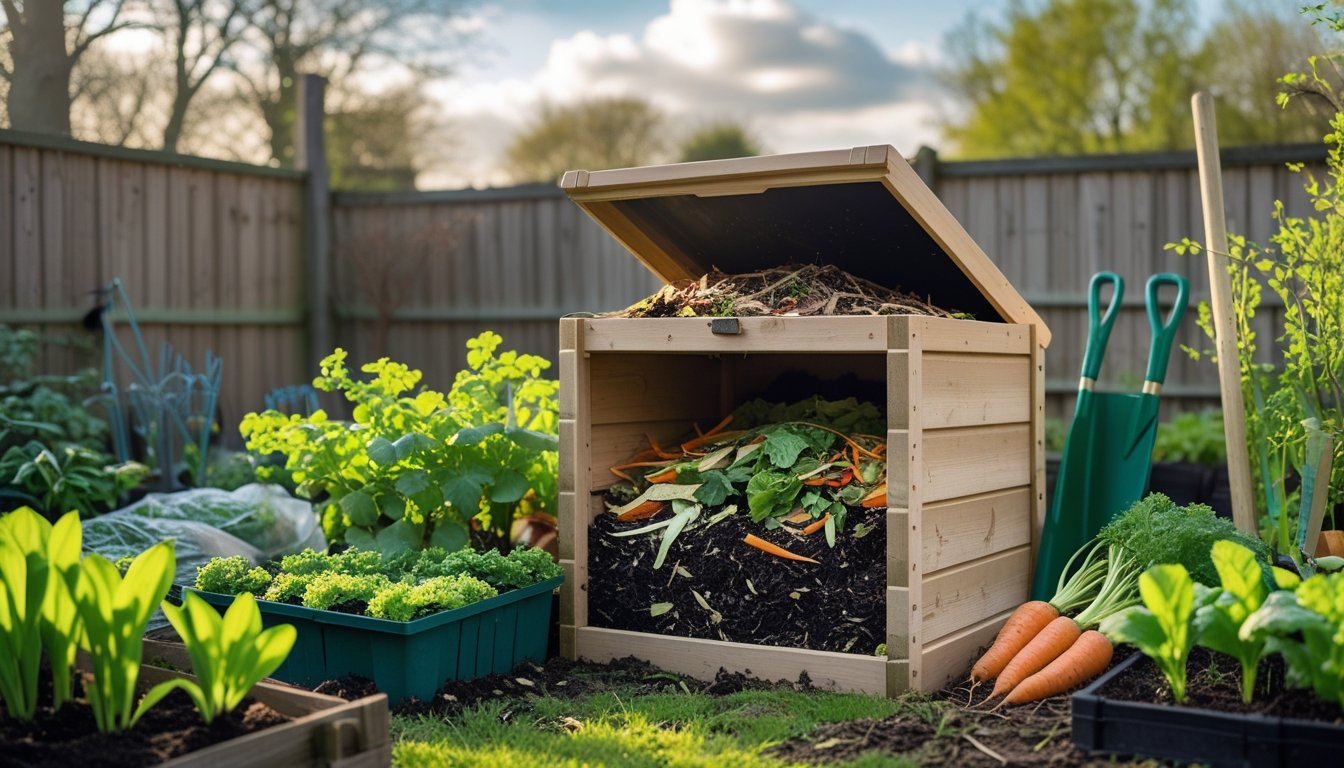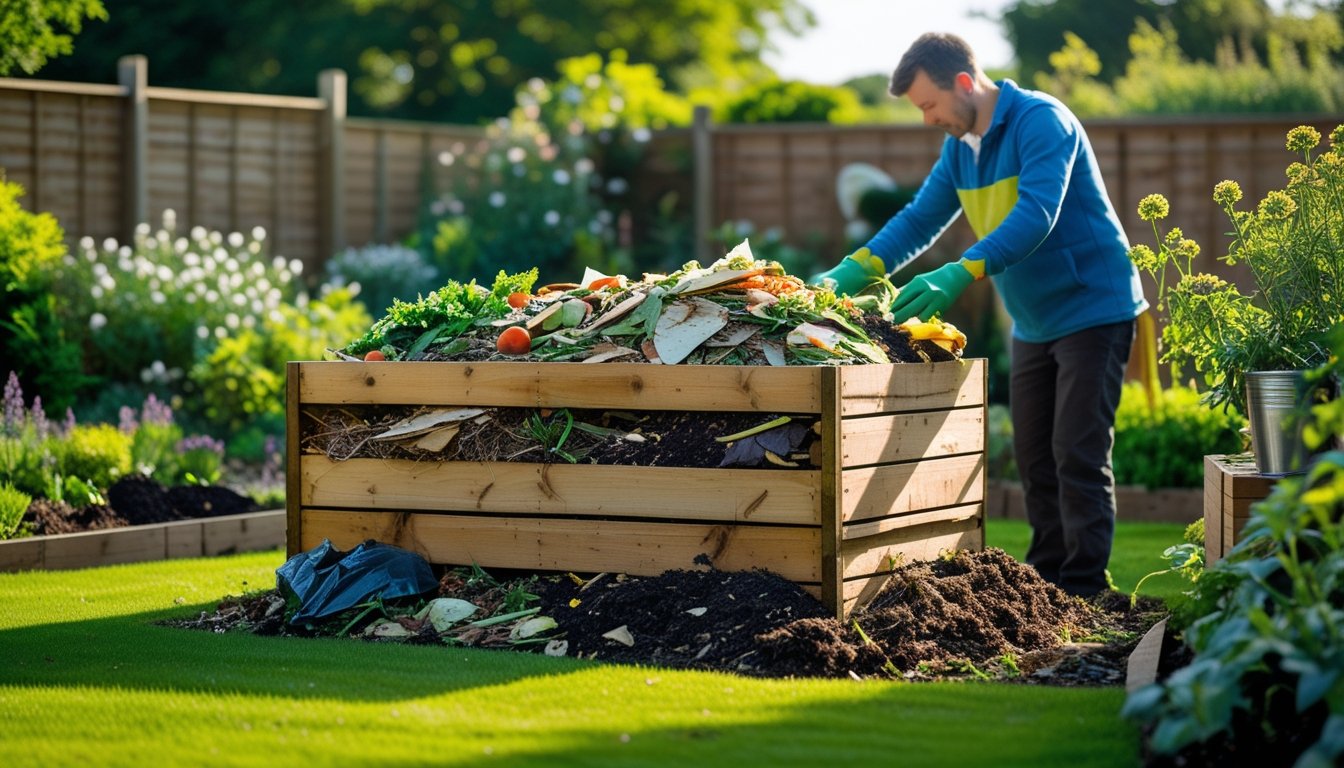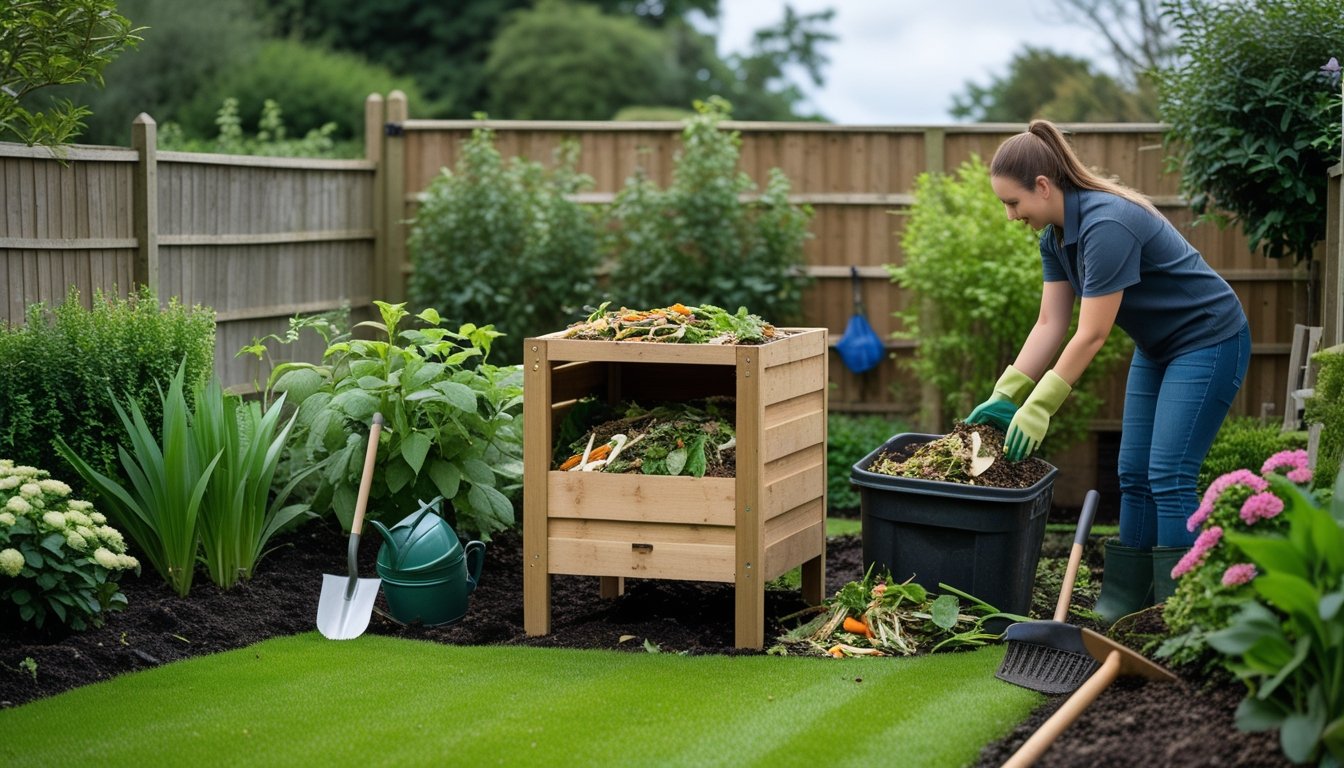Late updated: 02 Oct 2025 13:10
Written by: Emily Thornton
Simple Tips For Composting In UK Gardens: A Quick Guide
Composting is an indispensable practice for gardeners in the UK, enhancing garden soil while reducing waste. The key to successful composting lies in understanding the right balance of materials and maintenance for your heap. We can transform kitchen scraps and garden waste into rich, nutrient-filled compost with a few simple steps and tips.

For UK gardeners, it is essential to blend green materials, like fruit and vegetable scraps, with brown materials, such as leaves or shredded paper, to maintain the right mix. Plenty of practical tips and best practices can elevate our composting game, ensuring we create a thriving garden environment.
A compost bin can help manage our space efficiently and speed up the process. We'll answer common questions and highlight essential steps to composting success, ensuring even beginners have the confidence to start transforming waste into garden gold.
Key Takeaways
- Balance green and brown materials for effective composting.
- Compost bins optimise space and accelerate decomposition.
- Simple steps and tips improve soil while reducing waste.
Essential Steps for Successful Composting in UK Gardens
Embracing composting can transform garden waste and organic matter into vital resources for soil health and structure. By carefully selecting your compost bin, maintaining the right balance of materials, and ensuring aeration and proper moisture levels, we can create nutrient-rich compost that enriches our gardens.
Choosing the Right Compost Bin or Heap
Selecting the appropriate compost bin or heap is the foundation of effective composting. We have several options, including traditional compost heaps, enclosed compost bins, and wormeries. Compost heaps suit those with ample outdoor space and allow easy turning of materials. For smaller gardens, enclosed bins are ideal, as they provide insulation and reduce pest issues.
Wormeries accommodate a different composting approach, using worms to break down organic waste. This method is perfect for those with limited space or targeting food waste disposal. Consider your garden size, available space, and personal preferences when choosing the type of composting system. A proper setup aids in maintaining temperature, retention of moisture, and pest control.
Balancing Green and Brown Materials
Achieving nutrient-rich compost requires a balanced mix of green and brown materials. Green materials or nitrogen-rich components include kitchen scraps and fresh grass clippings. Brown materials or carbon-rich components such as dried leaves, straw, and paper provide structure to the compost and aid in aeration.
The ideal ratio is generally 2:1 of browns to greens. This balance supports microbial activity, essential for breaking down organic waste. Overloading with green materials can lead to a smelly, wet compost, while too many browns may prolong the composting process. Adjusting the mix as needed is key to fostering a thriving compost environment.
Maintaining Aeration and Moisture
Ensuring proper aeration and moisture levels are crucial for compost success. Aeration can be achieved by turning your compost regularly. This encourages microbial activity and prevents fermentation, which can produce unpleasant odours.
Our compost should feel like a wrung-out sponge, not too wet or too dry. Dry compost slows down decomposition, while overly moist compost can become smelly. Adding water or dry materials helps maintain balance. Consider the UK climate; frequent rainfalls may require additional dry materials, while occasional dry spells might necessitate more moisture.
Understanding the Composting Process
Composting involves the decomposition of organic matter through microbial activity. We can opt for either cold or hot composting methods. Hot composting requires frequent turning and monitoring temperature, accelerating the composting process. Turning once a week can produce usable compost within weeks.
Cold composting requires less maintenance and takes longer to complete, suitable for those with limited time. Fungi play a significant role in breaking down tougher materials like wood chips. Meanwhile, microbes and worms handle softer, nitrogen-rich materials. Recognising these varied roles enhances our ability to manage and accelerate the composting process effectively.
Simple Tips and Best Materials for Effective Composting

Effective composting requires a good balance of materials and regular attention to detail. Knowing what to include in your compost bin and what to avoid will significantly impact the quality of the finished compost we eventually use in our gardens.
What to Compost: Recommended Ingredients
The right ingredients are critical for successful composting. We should aim for a good mix of green materials like veg peelings, fruit scraps, coffee grounds, and grass clippings. These materials provide nitrogen, which is essential for decomposing organic matter.
Adding browns such as cardboard, plant trimmings, and annual weeds (before they go to seed) will contribute carbon, providing energy for the composting microbes. Including eggshells is also beneficial as they add calcium.
Organic tea bags can also go into the compost, but be sure they're fully biodegradable. Achieving the right balance of greens to browns—usually about 1 part greens to 2 parts browns—ensures an efficient composting process.
Items to Avoid in Your Compost Bin
Some items can disrupt the composting process or attract unwanted pests. We should avoid putting meat, dairy products, and oily foods into the compost bin, as these can cause odours and are slow to decompose.
Chemically treated wood, diseased plants, and pet waste are also best excluded, as they can introduce harmful bacteria or toxins. Additionally, while most tea bags are safe, some contain synthetic materials and should be avoided unless verified as biodegradable.
We should also be cautious with certain garden waste. For example, perennial weeds and those carrying seeds can cause issues if the compost doesn't reach high enough temperatures to kill them off.
Maximising Results With Routine Maintenance
Regular maintenance is vital for producing high-quality compost. We should frequently turn the compost to aerate it, as oxygen is essential for breaking down the materials efficiently. This also helps to mix the layers and accelerate decomposition.
Monitoring moisture is equally important. The compost should be as damp as a wrung-out sponge. If it's too dry, we can add water; if too wet, adding more dry materials like shredded cardboard or leaves will help.
Patience is key here. In time, we can use the rich, crumbly compost as a potting mix, for mulching beds, or enriching garden soil.
Frequently Asked Questions

Composting is both rewarding and environmentally friendly. While many people are eager to get started, questions about the process often arise. We aim to provide clear answers to some of the most common inquiries about composting in UK gardens.
How can I start composting at home in the UK?
Starting composting at home involves setting up a compost bin or pile, ideally placed in a well-drained, partially shaded location. It's important to have a balance of green materials (such as fruit and vegetable scraps) and brown materials (like dried leaves).
What are the best materials to add to a compost heap?
Excellent materials for a compost heap include vegetable peelings, coffee grounds, grass clippings, cardboard, and leaves. These provide a good mix of nitrogen-rich greens and carbon-rich browns, essential for efficient composting.
What items should never be composted in a garden setting?
Avoid composting meat, dairy, and cooked foods, as they attract pests. Diseased plants or those sprayed with chemicals should also be avoided to prevent contamination of the compost.
How long does it typically take for compost to mature in UK climates?
In the UK, it generally takes between six months and two years for compost to mature, depending on the materials used and conditions maintained. Regular turning of the compost can speed up the process.
Are there any specific considerations for composting in urban UK gardens?
Urban gardens may face space constraints, so using a compact compost bin is beneficial. Odour control and pest management are also more critical in urban settings, requiring careful material selection and regular monitoring.
How can pests be prevented in an outdoor compost bin?
To prevent pests, ensure food scraps are buried within the compost and avoid adding meats or fats. Keeping the bin covered and maintaining the correct moisture level can also help deter unwelcome visitors. Regularly turning the compost also discourages pests by disrupting their habitat.
